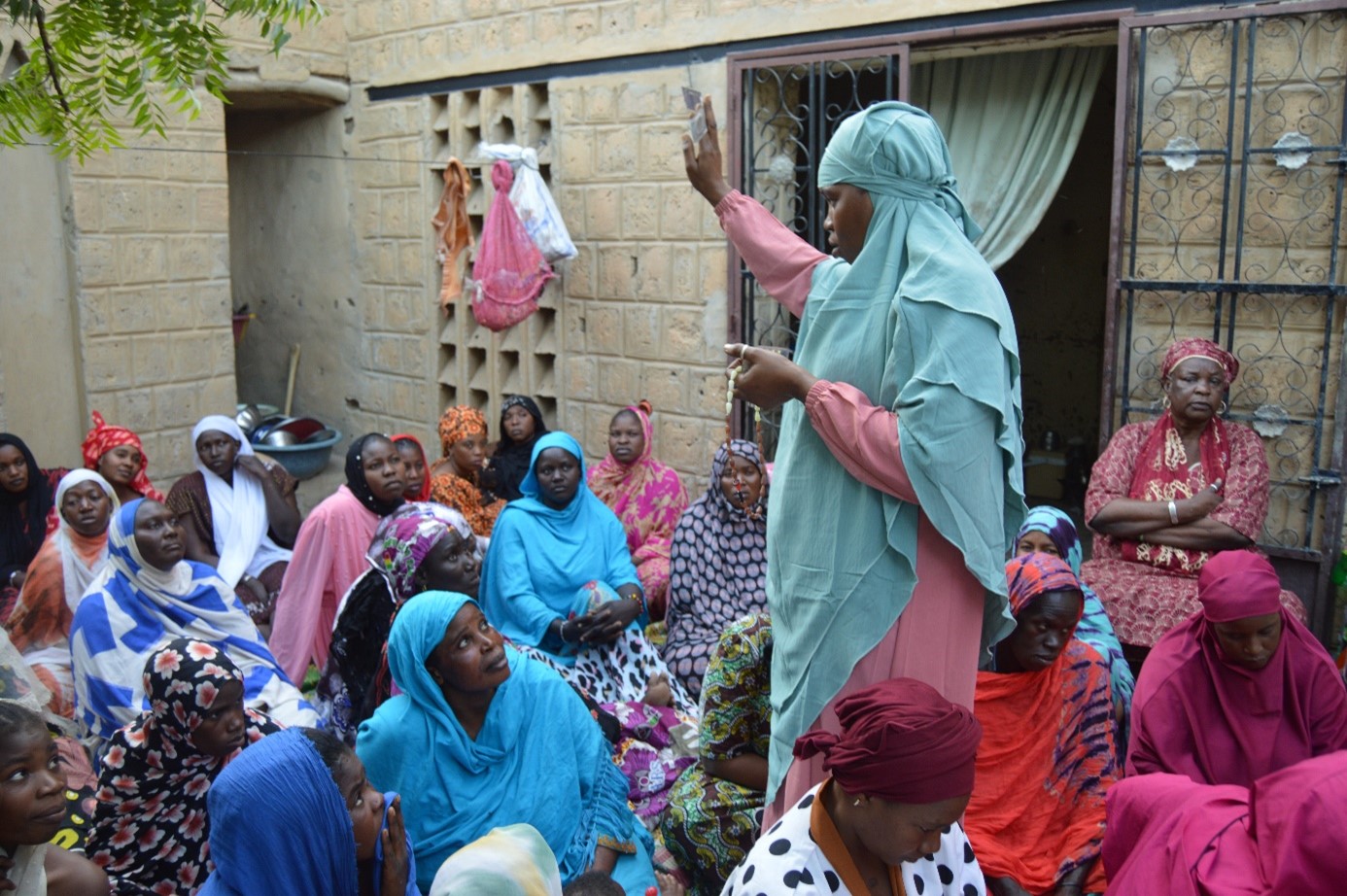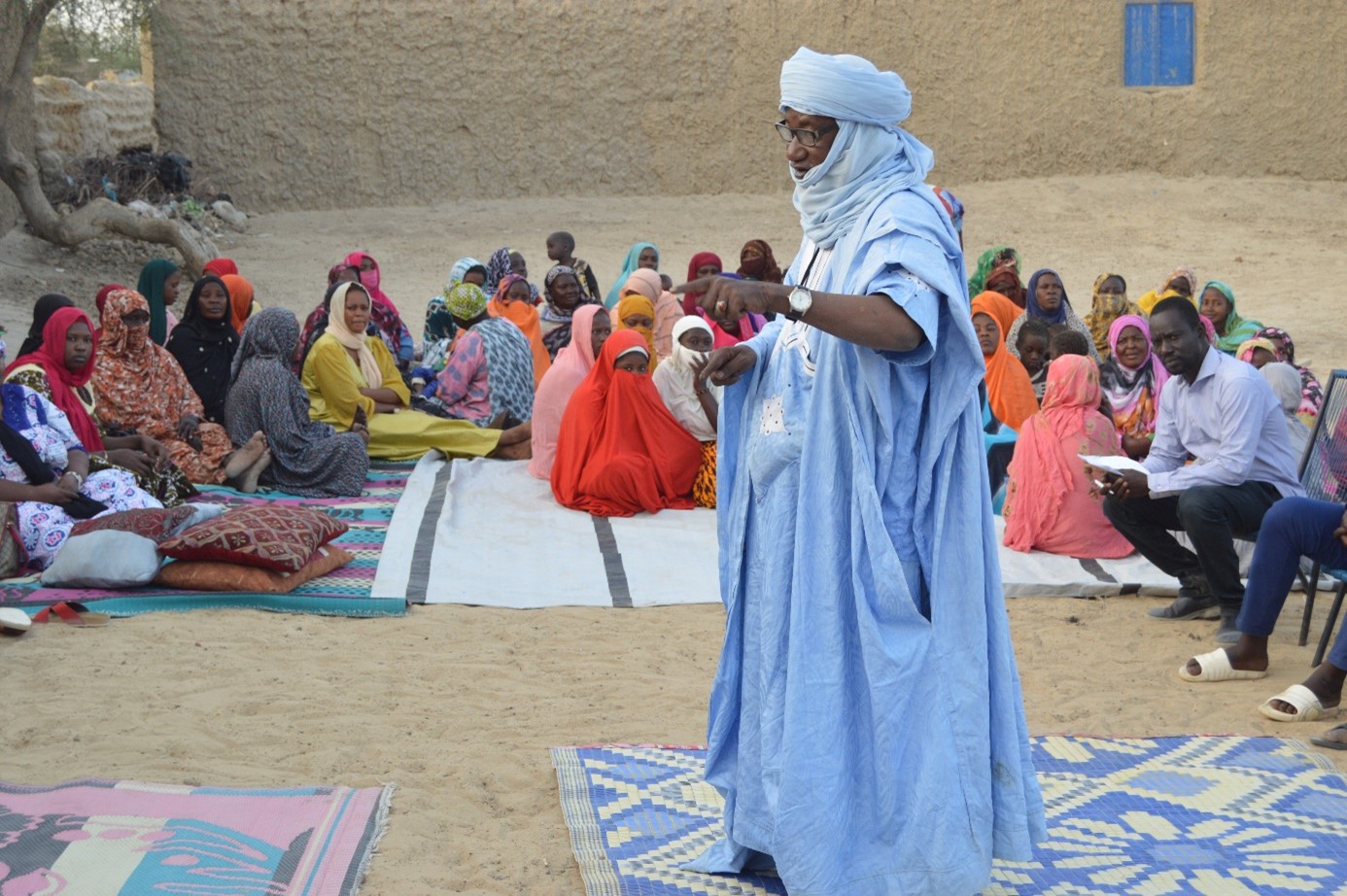Breaking the Silence on Family Planning in Northern Regions of Mali
Published on May 1, 2024
By Moussa Koumare, MOMENTUM Integrated Health Resilience Knowledge Management/Communications Advisor, Mali, and Demba Traoré, MOMENTUM Integrated Health Resilience Technical Director, Family Planning/Reproductive Health and Gender Lead, Mali

In a socially conservative country like Mali in sub-Saharan Africa, public discussions about voluntary family planning (FP) and sexuality have typically been taboo. But working with nongovernmental organizations (NGOs) in the northeast of this vast, arid land, MOMENTUM Integrated Health Resilience has been helping to open up dialogue on these important health topics. MOMENTUM supports local NGOs in Gao and Timbuktu in organizing regular talk sessions, bringing together women, youth, community leaders, and other influential actors from civil society. MOMENTUM support to the NGOs also includes staff training in FP, complying with governmental guidance on FP issues, reproductive health, data collection, and organizational management and strengthening.
Lalla Maiga, 58, is a female leader and session moderator from the Château neighborhood in the regional center of Gao, and also President of CAFO (Coordinated Women’s Associations). She highlighted how these community discussion activities have garnered the support of all generations in the community, in particular with members of the religious community.
“There was a time when this topic was poorly understood, especially within religious communities,” she explained. “However, the situation has changed with the involvement of a marabout (a Muslim holy man) member of our ASACO (Community Health Association), who has dedicated himself to promoting family planning. Today, thanks to his support and commitment, FP is better accepted and understood within the community.”
In Timbuktu, 25-year-old Agaicha Cisse, a mother of three, echoes similar sentiments. After a difficult pregnancy, an awareness session by a local NGO–the Association for the Development of Community Initiatives in the Sahel–illuminated FP’s benefits to Agaicha.
“My closely spaced pregnancies led to complications for my second child, including malnutrition. It was after participating in an awareness session on the benefits of family planning that I was convinced of its merits,” Agaicha says. “My husband also supported me by accompanying me to the (community health center) to adopt FP. Today, my youngest child is in better health, illnesses are less frequent, and I am thriving.”
Addressing Mortality
In Mali, limited use of reproductive health services, particularly family planning, contributes significantly to morbidity and deaths among women during pregnancy, childbirth, and the postpartum period. Despite recent improvements, the maternal mortality rate stands at 325 per 100,000 live births, while the newborn mortality rate is 33 per 1,000 live births. These are among the highest rates in the world.
Family planning is an essential means of combating maternal, newborn, and infant mortality. As noted by USAID, family planning helps to protect women’s and children’s health, improves women’s opportunities for education and employment, and reduces poverty, among other beneficial outcomes.
During the discussion sessions, courageous voices from the community often emerge, indicating a transformation in perspective and dispelling deeply-rooted, age-old prejudices surrounding family planning. This achieves a desired objective of the sessions: to foster the integration of FP into the population’s health habits.

These exchanges have also fostered intergenerational dialogue, during which youth play a crucial role in changing attitudes within their families. Ibrahim Adramane, 23, a leader and community mobilizer from Gao, explains, “When we started these discussions (June 2023), some heads of families rejected us, treating us like poorly educated children. But thanks to the determination of our team, all of that is now in the past. I feel a particular pride in seeing that today, some young people, whether girls or boys, can directly engage with their parents.”
The discussions involve 35 participants on average, but sometimes attendance reaches 100. There has been continued reluctance among some men to allow their partners access to FP. But this has been changing for the better.
Making Breakthroughs
Aissata Aboubacrine, a midwife and family planning officer at Gao’s Boulgoundié Health Center, emphasizes the need to directly target heads of households: “We now observe significant improvement in the use of family planning services in our center. Previously, women would hide contraceptive methods, and I often faced difficult situations with some husbands who complained because I had agreed to plan with their wives without their permission. Fortunately, I no longer encounter such issues. Clients are no longer ashamed to visit the family planning unit, even during the day, and some are even accompanied by their husbands.”
To date, 2,398 community members have been reached through these discussion sessions, which break down barriers around family planning by promoting dialogue and paving the way for a future where reproductive health is addressed without fear or stigma. In fragile settings like Gao and Timbuktu, such discussions with youth and communities help to reinforce the need for FP as one aspect of strengthening health resilience in Mali.

